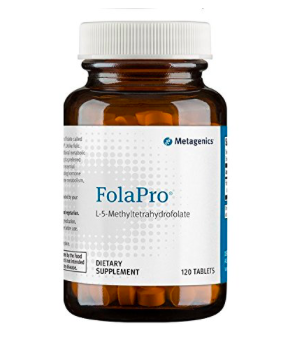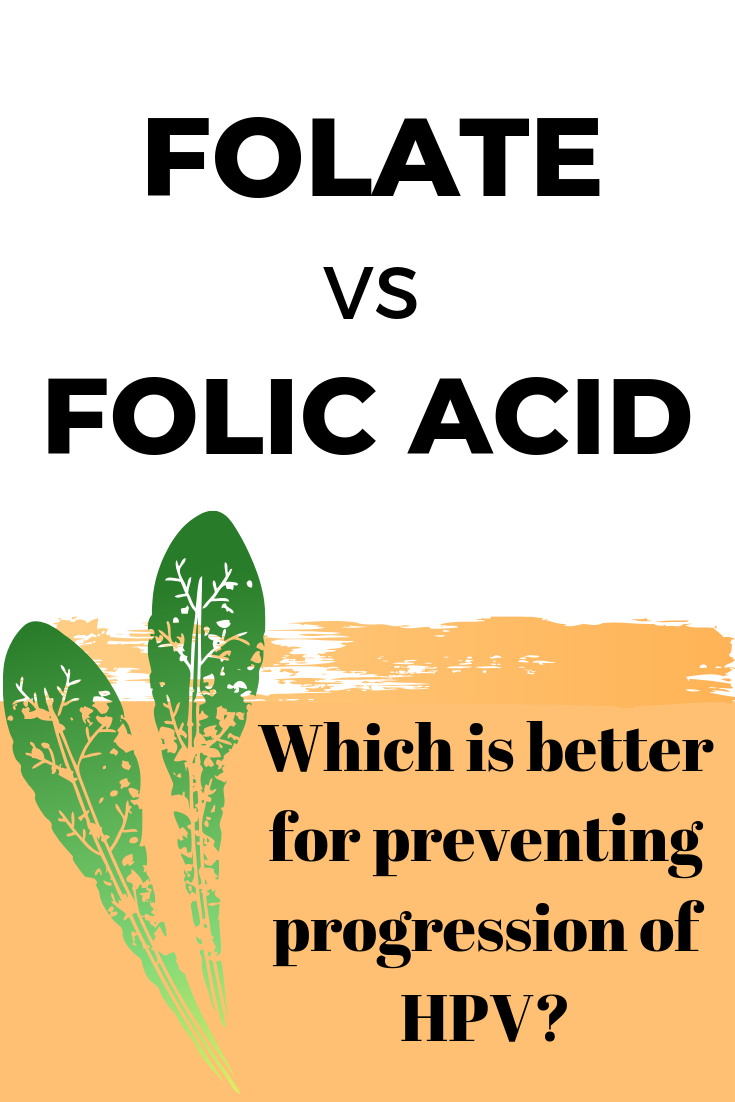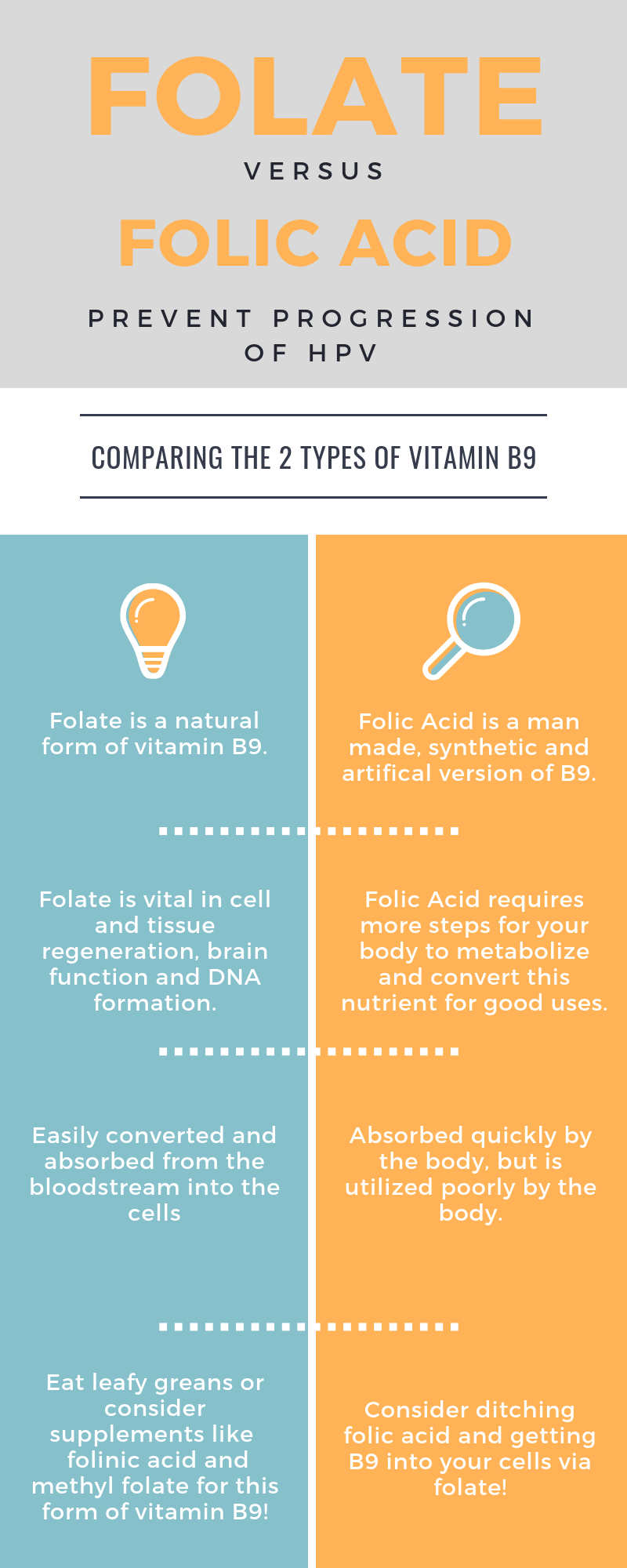Folate VS Folic Acid:
What You Need To Know
Both folate and folic acid are different forms of vitamin B9. Although they are both forms of vitamin B9, the body uses each different forms in different ways.
This article will discuss the difference between folate and folic acid, the role of vitamin B in the body, natural food sources that you can find folate, discuss folate and its role in naturally and holistically working with HPV, link to clinical studies of folate supplements and HPV, and discuss high-quality folate supplements to consider.
Folate vs Folic Acid
Folate and folic acid may be used interchangeably, however there are some key differences you should understand about these different forms of vitamin B9. They both are forms of vitamin B9, however the way the body metabolizes and converts each sustance is important to understand.
Folate
Folate is a naturally occurring nutrient. Folate is the active form of vitamin B9 and is known as levomefolic acid or 5-methyltetrahydrofolate (5-MTHF). When you take a folate supplement, your body can easily convert folate as its active form into 5-MTHF before it enters the bloodstream. It is in this form that the body is more easily able to use the folate. Essentially, your body is able to convert it to 5-MTHF more easily, and use it more directly and more quickly than folic acid.
Folic Acid
Folic acid is the synthetic version of folate, it is known as pteroylmonoglutamic acid. One may choose to take folic acid supplements, or may consume foods that are known to be fortified with this supplement like cereals and flour. Before the body can appropriately use a folic acid supplement you take, or the foods fortified with folic acid, your digestive system must first convert all the folic acid to 5-MTHF. However with folic acid, this process is much more lengthy and does not always fully convert all of the folic acid in the body before it reaches the bloodstream.
One concern is that the body may not metabolize and convert all of the folic acid successfully, thus leading to folic acid building up in the bloodstream. Unused folic acid lingering in the body is known to have damaging health effects like increased cancer risk and B12 deficiencies which can lead to nerve and cognitive issues. Folic acid is essentially the artificial form of folate.
[thrive_leads id=’2251′]Folate And HPV
According to clinical studies from the University of Alabama at Birmingham, supplements like folate may stop or delay the development of cervical cancer in women who have been diagnosed and infected with human papillomavirus. Women who have been diagnosed with HPV or any level of CIN should discuss with their primary care physician about adding a high-quality folate supplement into their healthcare routine.
[thrive_leads id=’1843′]
Related Article: My Story About Finding Natural Healing From CIN 3 High Grade Cervical Dysplasia
How Much Folate Do Studies Show Is Beneficial For Stopping HPV Related CIN Progression?
Doctors recommend 400mcg-800mcg of methyl folate as a daily oral supplement. Discuss with your doctor the best dosage of folate for your body and your case.
The Role of Vitamin B9 In The Body
One of the most critical roles of vitamin B9 is cell growth and healthy formation of within the body. Because high-risk HPV strains can cause cervical dysplasia, vitamin B9 is recommended by doctors as a good supplement to consider, as it promotes healthy cell growth and generation. HPV related cervical dysplasia can deformed, or dysplastic, cells of the cervix. The more dysplastic cells that build up, the higher likelihood cancer may develop. Vitamin B9 in particular is critical in tissue growth and healthy functioning cells.
Nutrifacts.org shares that:
“According to European Food Safety Authority (EFSA), which provides scientific advice to assist policy makers, has confirmed that clear health benefits have been established for the dietary intake of folate (vitamin B9) in contributing to:
normal blood formation;
normal homocysteine;
normal metabolism of the immune system;
normal cell division;
normal maternal tissue growth during pregnancy;
normal amino acid synthesis;
normal psychological functions;
the reduction of tiredness and fatigue;
maintenance of normal vision;
In addition, the EFSA has confirmed that supplemental folate intake increases maternal folate status, which contributes to the reduction of the risk of neural tube defects (NTD).”
Natural Food Sources That Contain Folate
If you are looking for natural food sources that contain folate, increasing dark leafy greens is the best dietary source of folate that is currently recommended. Other green vegetables like asparagus, legumes, broccoli, avocados and brussels sprouts are naturally high in folate. If you are looking to get the most benefits of vitamin B9 in the body, consider these whole foods as a part of your daily diet.
High-Quality Folate Supplement Recommendation

If you choose to add a B9 supplement into your daily healthcare routine, methyl folate is the ideal alternative to folic acid. Consider Metagenics FolaPro as a high-quality supplement that your body can readily use.
I recommend this brand in particular because my personal naturopathic doctor recommended Metagenics Folapro when I was diagnosed with CIN 3 as a way to naturally treat HPV and cervical dysplasia. It was using this specific supplement and other healthy lifestyle changes that I was able to reverse the CIN3 diagnoses and have had normal pap results for nearly 4 years now.
You can read more about the other steps I took here.
My daily dose was 800mcg, 1 pill daily for 12 months. Consider discussing this with your primary care physician if you are thinking about using folate as a method to help repair the negative cell changes from HPV and prevent further CIN progression.
[thrive_leads id=’1843′]
Sources:
https://www.nutri-facts.org/en_US/nutrients/vitamins/b9/health-functions.html https://www.healthline.com/nutrition/folic-acid#what-it-is https://ichgcp.net/clinical-trials-registry/NCT00703196 [thrive_leads id=’2251′] This post contains affiliate links, including Amazon. I may earn a small commission if you use one of my links to make a purchase (at no extra cost to you). I only share products that I have greatly benefited from using myself to reverse my high grade cervical dysplasia.Love this post? Want to reference it later?
Pin it!






